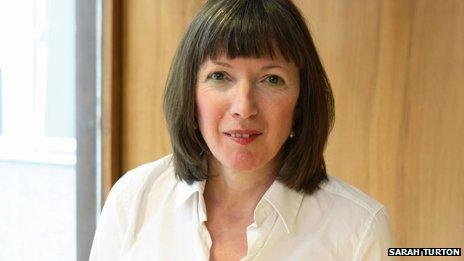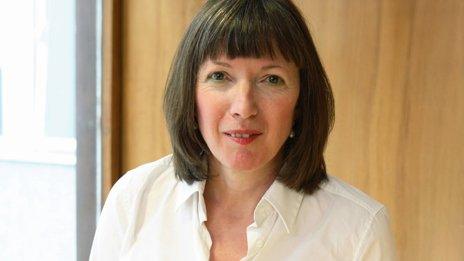Profile: Frances O'Grady, the new TUC general secretary
- Published

For the first time a woman has been elected as the leader of the Trades Union Congress - but how will Frances O'Grady handle relations with hard-line union colleagues spoiling for a fight over government spending cuts and austerity?
A union official all her life Frances O'Grady, is the woman chosen by her fellow trade unionists to lead them through testing economic times.
Born in Oxford in 1959 - one of five children in a working-class family of Irish origin - her upbringing was steeped in trade unionism. Her grandfather was the founder of the Irish Transport and General Workers Union, and her father was a shop steward at the Leyland car plant in Cowley.
At the height of production, 20,000 people worked at the various plants. However, unlike some of the more militant operations, O'Grady's father took a a more measured approach to disputes, building campaigns from the bottom up.
"When you're trying to put forward a policy of any sort, you've got to take the troops with you. It's no good being on a grey horse out in front, if you don't have the troops behind you," says Bill Jupp - a fellow shop steward along with O'Grady's father.
So, that was the style of industrial relations that Frances O'Grady learned from her father. Her formal schooling, meanwhile, was in the hands of Milham Ford - a girl's grammar school which became a comprehensive while she was still in attendance.
The school had an excellent academic reputation and teachers there remember young Frances as challenging and stimulating, and her family being very supportive of their girl's education.

Frances O'Grady's father was a shop steward at the Leyland car plant in Cowley, Oxfordshire.
Frances was keen on drama and by the age of 17, was also learning about the world of work. She took a part-time job in the kitchens of an Oxford college - an eye opening experience for young Frances, says journalist Kevin Maguire of The Mirror.
"She could see for herself people who were born with a lot more privilege than others. Frances O'Grady is very aware of economic and social divisions in Britain... she's aware it's not everybody together."
Given her background, it was perhaps inevitable that after studying politics and modern history at Manchester University, O'Grady would embark on what has turned out to be a life-long trade union career.
Following family tradition
In her early twenties, she went to work as a researcher for her father's old union - The Transport and General Workers Union (TGWU) - focusing on issues of equality.
She was recruited by the union's national women's secretary Margaret Prosser and 30 years on, the now Baroness Prosser says Frances helped to highlight the issue of women's rights in her time there.
"She had a really nice way with her which meant that she could bring some of the 'male, pale and stale' people into the union who were not convinced of the equality agenda."
While at the TGWU Frances O'Grady was also raising her two children on her own, after splitting with her partner.
She realised early on that women would play an increasingly significant part in a unionised workforce - and she was right, as today there are more women union members than there are men.
She moved from the TGWU to the Trades Union Congress (TUC) in 1994 and two years later she founded a TUC academy to train the union organisers of the future - many of whom she expected to be women.
One of the academy's graduates is Sally Hunt - now general secretary of the University and College Union - who remains close friends with O'Grady.
"Frances is someone who can sit down and shift the pressure points of something you might have been dealing with and sit and talk to you about life, about family, about what we've seen on telly," she says.
"She's just a human being - a really normal person."
Ordinary, campaigning, committed to justice - a combination that in some might come across as a bit pious, but not in Frances O'Grady, says Kevin Maguire: "She doesn't spend her weekends on the North London lefty dinner table circuit. She gets on with her life.
"I suspect if someone met her and didn't know her, they wouldn't immediately say she was a campaigner because she will just introduce subjects in a way that relates to people's lives instead of preaching from a pulpit."
Challenges ahead
Frances O'Grady has moved through various roles in the TUC, cementing her reputation as a campaigner - and having taken herself off to complete a creative writing course, a good communicator, too.
But campaigning is one thing - managing relations with unions as their members face potential job losses and cuts in pensions and other benefits is another.
While many of the big beasts of the union movement have built their reputation on confrontation, O'Grady has not - and according to The Daily Telegraph columnist Dan Hodges, some will want to continue to do it their way.
"That is Frances O'Grady's biggest challenge - how does she maintain relevance for her organisation at a time of greater independence and greater strength by the individual unions that are part of the TUC family?
"You have general secretaries like Len McCluskey, leader of Unite union, who is adopting a much more independent political strategy and the question is how will Frances continue to herd these quite militant cats?"
The excitement over the selection of a woman as leader of the TUC is probably why nobody is really prepared to stand-up and publicly criticise Frances O'Grady right now.
For the time being she is barely known outside the union movement, but the honeymoon will surely end by the time she takes over from the TUC's current general secretary Brendan Barber next year - and as austerity bites harder.
And with some of her more radical colleagues champing at the bit, her preference for persuasion over confrontation will be put to the test.
This edition of Profile was first broadcast on BBC Radio 4 on Saturday, 18 August 2012. Listen again via the Radio 4 website or download the podcast.
- Published10 July 2012

- Published18 April 2012

- Published6 December 2016
